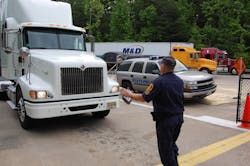Starting today, the “soft enforcement” period for the electronic logging device (ELD) mandate begins as roadside enforcement personnel throughout the U.S. start documenting violations of the rule, according to the Commercial Vehicle Safety Administration (CVSA)
“At a jurisdiction’s discretion, they may issue citations to commercial motor vehicle drivers operating vehicles without a compliant ELD,” noted CVSA Executive Director Collin Mooney in a statement.
"Enforcement personnel have been trained in anticipation of the ELD rule and now that it is in effect, inspectors will be verifying hours-of-service compliance by reviewing records of duty status requirements electronically,” he added. “And on April 1, 2018, inspectors will start placing commercial motor vehicle drivers out of service if their vehicle is not equipped with the required ELD.”
[More information regarding enforcement of the new rule is available at the Federal Motor Carrier Safety Administration’s ELD implementation website]
CVSA also pointed out that fleets and drivers may continue using “grandfathered” automatic onboard recording devices (AOBRD) that meet the requirements of 49 CFR 395.15 until Dec. 16, 2019, which is when they, too, must switch over the ELDs.
CarrierLists has been polling fleets for several months on ELD preparations ahead of the mandate. As of early December, about 75% fleets said they were ELD ready, up from around 50% in October.
Kevin Hill, founder of CarrierLists, said it is no surprise to see the sharp increase ahead of the deadline, but the last-minute push will likely lead to initial confusion due to a lack of training and practice time.
Overall, ELD rates among regional haulers lagged other fleets, with tank and bulk carriers ranking the least compliant, according to the company’s data Reefer carriers were most compliant at about 90%, while dry van carriers were second with 75%.
About the Author
Fleet Owner Staff
Our Editorial Team
Kevin Jones, Editorial Director, Commercial Vehicle Group
Cristina Commendatore, Executive Editor
Scott Achelpohl, Managing Editor
Josh Fisher, Senior Editor
Catharine Conway, Digital Editor
Eric Van Egeren, Art Director
